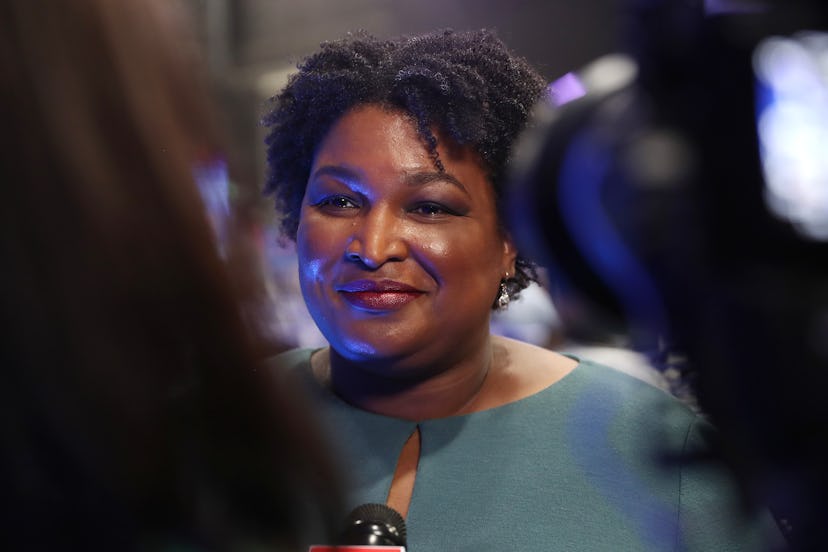Rule Breakers
Stacey Abrams Is Fighting Harder Than Ever
Her Amazon documentary, All In, is a searing indictment of voter suppression.

Stacey Abrams is unapologetically nerdy. "I was an unusually informed teenage voter," the Georgia politician tells Bustle. Before she could legally vote herself, she'd hand out sample ballots to fellow students. "Part of my self-appointed responsibility was making sure people understood [voting]," she says. It's a trait that took her from high school valedictorian to the Georgia state legislature. And in a new Amazon film, All In: The Fight for Democracy, she channels that meticulous energy to the screen, showing the historical legacy of voter suppression.
With directors Lisa Cortés and Liz Garbus (What Happened, Miss Simone?) at the helm, the documentary, available now, guides viewers from the Reconstruction Era to present-day Georgia, Abrams’ home state. In 2013, she founded the nonpartisan New Georgia Project, with the aim to register people to vote from a demographic she calls the “new American majority": people of color, unmarried women, and young people. The nonprofit has registered 250,000 Georgians to date. And she kept moving.
This year, amid rumors she could be tapped as Joe Biden’s vice presidential candidate, she focused instead on Fair Fight and Fair Count, two organizations that fight voter and census suppression, respectively. She talked to Bustle about the shifting, unusual forms that Jim Crow policies take today.
Registering voters is hard work. How do you respond to someone who says, “I don’t follow politics”?
Registration is like handing someone the key to the car but not teaching them how to drive. I believe in voter engagement. You want to give them a reason to care. Ask people, "What are the things you're worried about?" It’s connecting the dots between a vote and the problem. Make it a very specific thing. If the problem you see is that too many young people get high sentences for [minor] crimes they commit, you need to vote because you get to pick the district attorney.
But don't pretend voting is a magic pill. It's like taking medicine for a disease. You have to keep taking it again and again. Because no, politicians aren't going to fix your life unless they know about your needs [and] your community. Voting is about going back and saying, "You didn't do your job, and now I'm going to pick somebody else."
Your film is about voter suppression and all the manifestations of it. Do you see it changing form with the pandemic?
So voter suppression is very protean, but it's pedestrian in its overall architecture: Are they stopping you from registering and staying on the rolls? Are they stopping you from casting your ballot? Are they preventing it from being counted? Those are the three methods.
Right now, the most publicly aggressive action is to stop you from casting your ballot. Clearly it's an impediment to vote by mail if there's no mail. In Texas, you are not permitted to vote by mail based on COVID-19 [fears]. But in Oklahoma and Missouri, you need a notary to authorize your absentee ballot. Well, in Oklahoma, a notary can only notarize 20 absentee ballots. There aren't enough notaries to notarize all of the eligible applicants. It differs from state to state — 50 states with 50 different rules for how [voting] happens.
It’s overwhelming. How do you stay focused?
We can easily be overwhelmed by the sheer volume and noise. No. Focus back in. Are they stopping you from registering, from casting your ballot, or from having it counted?
Can you give me an example of the last point, of someone whose ballot wasn’t counted?
OK, if you live in Georgia [or] Florida, you are twice as likely to have your absentee ballot rejected if you're Latino or African American. Here's how they do it: In Georgia, for example, we have immigrants from Asia who are naturalized citizens. The way they sign their names might not be familiar to a poll worker, who tends to be in their 60s. [Also], when you get your license in Georgia, you sign a little pad like at CVS, with a plastic pen. Compare that signature to the one you use with pen and paper. There's no way they match — mine doesn't match from Kroger to CVS. In Florida, they can look at those two signatures and decide they're going to throw your ballot out.
That's why I talk about the architecture of voter suppression. We focus so much on Election Day that we forget the things that come before it. In Texas, in the midst of COVID, they will not let you register online [in most cases]. So millions of people have to go in person to sign up to vote. How many people in the midst of COVID-19 are going out in person to do that?
My last question: On a scale of 1 to 10, how are you feeling about the integrity of this election?
It depends on where you live. We have a nation with 50 different democracies. If I live in Oregon, I'm feeling great. But if you live in Texas or Alabama, you can't vote by mail. If you live in Texas and Georgia, you risk polling places being shut down. If you live in Georgia, the voting machines may or may not work. So it's not right to assign a number. We have to assign an intensity factor. And I think there is an intense attempt to undermine the right to vote. We have to match that intensity with our determination to be heard.
Are you ready for Election Day? Start by registering to vote and making a plan for Nov. 3.
This article was originally published on